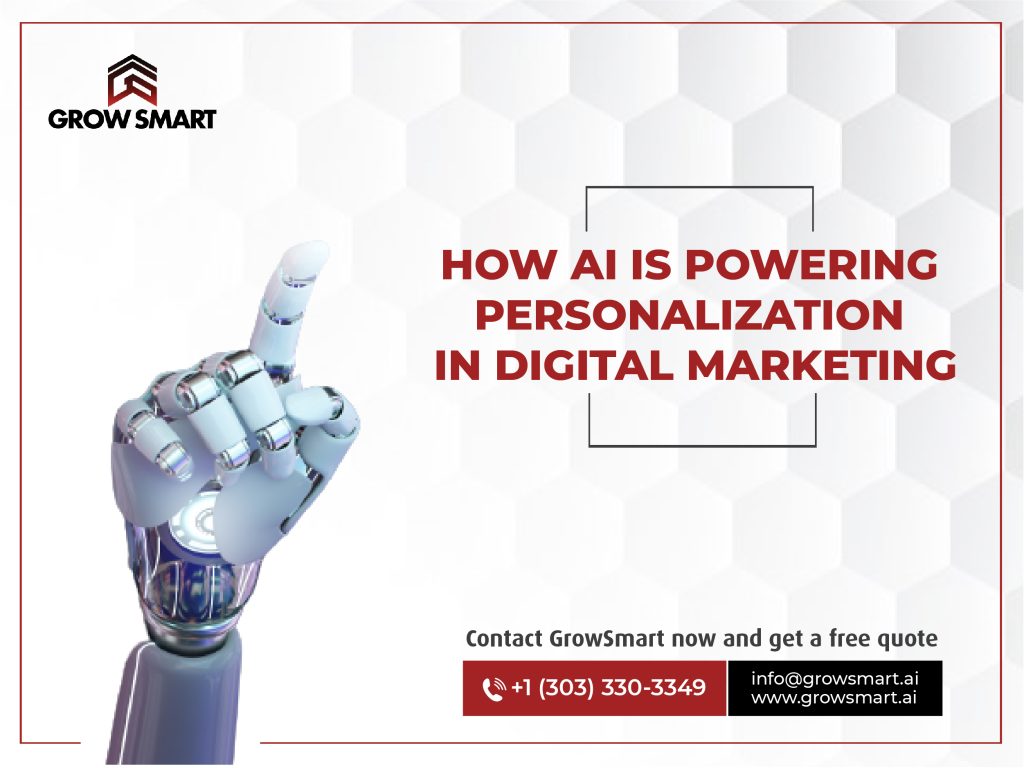
Artificial intelligence (AI) has significantly impacted digital marketing, and personalization has been one of its primary applications. Personalization refers to the ability to tailor content and experiences to meet individual customers’ needs and preferences. In this blog, we’ll explore how AI powers personalization in digital marketing and why it’s becoming increasingly important for businesses to leverage AI to deliver personalized customer experiences.
Machine Learning Algorithms
One of the key ways AI is powering personalization in digital marketing is through machine learning algorithms to analyze customer data. Machine learning algorithms can analyze large amounts of data in real-time and predict customer behavior. This enables businesses to deliver more targeted and relevant experiences to their customers.
For example, an e-commerce store can use machine learning algorithms to analyze customer purchase history, browsing behavior, and search terms to make personalized product recommendations. By using machine learning algorithms to analyze customer data, businesses can deliver personalized experiences that are more likely to convert.
Chatbots
Another way AI is powering personalization in digital marketing is through chatbots. Chatbots are AI-powered tools that can be integrated into websites and social media platforms to provide 24/7 customer support and streamline the customer journey. With the ability to understand natural language, chatbots can provide personalized customer support by answering customer questions, resolving customer issues, and guiding customers to the information they need.
By using chatbots, businesses can provide a more convenient and personalized customer experience, which can help to increase engagement and conversions. Chatbots can also collect customer data and provide personalized experiences based on that data. For example, a chatbot can provide personalized product recommendations based on customer purchase history and browsing behavior.
Voice Search Optimization
Personalization can also be achieved through the use of voice search optimization. With the increasing popularity of voice search, AI can help businesses optimize their websites for voice search, allowing them to reach customers who use voice search to find products and services.
Voice search optimization involves using natural language processing (NLP) to understand customer queries and deliver relevant results. By using AI to optimize voice search, businesses can deliver personalized experiences to customers who prefer to use voice search, increasing the likelihood of attracting and retaining those customers.
Image Recognition
Another way AI is powering personalization in digital marketing is through image recognition. Image recognition is a form of AI that allows businesses to recognize images and use that information to deliver personalized experiences.
Businesses can use AI to analyze images to deliver more personalized customer experiences, increasing engagement and conversions. For example, an e-commerce store can use image recognition to provide personalized product recommendations based on images uploaded by customers. Image recognition can also be used in visual search engines to deliver relevant results based on the content of an image.
Predictive Analytics
Another way AI is powering personalization in digital marketing is through predictive analytics. Predictive analytics involves machine learning algorithms to analyze customer data and predict customer behavior. For example, a business can use predictive analytics to predict which products a customer is most likely to purchase, allowing it to create targeted marketing campaigns that are more likely to convert.
Predictive analytics can also be used to optimize marketing campaigns by analyzing data in real time and adjusting the reach of the target audience more effectively. By using AI to analyze customer data and make predictions, businesses can deliver more personalized customer experiences, increasing engagement and conversions.
Customer Segmentation
Finally, AI can also power personalization by enabling businesses to segment their customers into groups based on common characteristics and behaviors. This allows businesses to deliver tailored experiences to each group of customers based on their unique needs and preferences.
For example, a business could segment its customers into groups based on age, location, or purchase history. By using AI to segment its customers, the business can deliver personalized experiences that are relevant and engaging for each group. This can help to increase customer loyalty and customer lifetime value.
Conclusion
In conclusion, AI is powering personalization in digital marketing in several ways, from machine learning algorithms and chatbots to voice search optimization, image recognition, predictive analytics, and customer segmentation. By leveraging AI to deliver personalized customer experiences, businesses can increase engagement, conversions, and customer loyalty. As AI advances, we can expect to see even more innovative and effective applications of AI in personalization and digital marketing.







